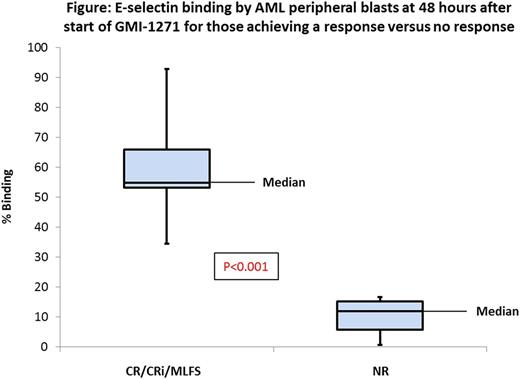Abstract
Background
Binding of E-selectin (E-sel), an adhesion molecule expressed in the vasculature of the bone marrow, to sialyl Lex on the leukemic cell surface activates cell survival pathways and promotes chemotherapy resistance in AML. GMI-1271 is a novel E-selectin antagonist that disrupts activation of cell survival pathways, enhances chemotherapy response with improved survival in mouse xenograft and syngeneic models and protects from chemotherapy toxicity in vivo (Becker 2013; Winkler 2013, 2014, 2016). We added GMI-1271 to salvage with MEC for relapsed/refractory AML patients or to induction with 7+3 for older treatment naïve (TN) AML patients.
Methods
A Phase (Ph) 1 trial escalated GMI-1271 (5-20 mg/kg) combined with MEC (mitoxantrone, etoposide, cytarabine) in pts with R/R AML, to evaluate safety, tolerability and anti-leukemic activity. Dose limiting toxicity (DLT) was defined as persistent cytopenias in the absence of disease or any Grade 3-5 non-hematologic toxicity beyond day 42. The recommended Ph 2 dose (RP2D) of GMI-1271 was 10 mg/kg. A Ph 2 study then enrolled 47 pts with R/R AML for GMI-1271 plus MEC chemotherapy. Responders could receive 1 cycle of consolidation with GMI-1271 plus MEC. We also enrolled a separate Ph 2 cohort of 25 pts ≥60 yrs with TN AML for GMI-1271 (10 mg/kg) plus cytarabine and idarubicin (7+3). Two cycles of induction were allowed. Responders could receive 3 cycles of consolidation with GMI-1271 plus intermediate dose cytarabine. Prior treatment of MDS was allowed; for R/R disease prior SCT was allowed. GMI-1271 was given 24 hrs prior, then every 12 hrs during and for 48 hrs post chemotherapy. E-sel ligand expression on leukemic blasts in blood and bone marrow was assessed by flow cytometry, for the percentage of blasts binding to E-sel-Fc chimera and HECA452 (antibody to sialyl Lex).
Results
91 pts were enrolled (Ph 1 R/R=19; Ph 2 R/R=47, TN=25). Median age for R/R pts was 59 yrs (range 26-84) and 62% were males. Prior AML history included 32% primary refractory, 33% CR1<6 mos; 17% prior SCT; 58% unfavorable cytogenetics by SWOG (CG). GMI-1271 was well tolerated with no DLT, and adverse events were typical for AML chemotherapy with no unexpected toxicities. Grade 3/4 mucositis was <4% with MEC. Median time to ANC 500 was 32d (range 23-66). 30 and 60 d mortality were 2 and 9%, respectively; all deaths within 60 d involved persistent disease. At RP2D in R/R, remission rate (CR/CRi) was 41% and ORR (CR/CRi/MLFS/PR) was 50%. In Ph 1, median OS was 7.6 mos; median DFS was 11.1 mos. In Ph 2, median OS and DFS are not yet reached; median follow up is 5 mos. 9 (14%) proceeded to SCT by data cut-off. Correlative studies demonstrated increased percentage of circulating blasts expressing E-sel ligand at baseline, 12 and 48 hrs (Figure) post-first dose of GMI-1271 in responding patients (CR/CRi/MLFS) versus nonresponders (p=0.03, p<0.001, p<0.001, respectively for timepoint). Median E-sel ligand expression at baseline was 28% (range, 1-85%) of bone marrow blasts, was higher in those achieving remission (p=0.002), and correlated with Event-Free Survival (r=0.47, p=0.03).
Median age for TN pts was 67 yrs (range, 60-79) 56% were males, and 32% had high-risk CG. 56% had secondary AML (sAML), 43% of sAML had prior hypomethylating therapy. GMI-1271 was well tolerated, adverse events were typical for AML induction in the TN population, and Grade 3/4 mucositis was not seen. 30 and 60 d mortality were 8 and 12%, respectively; two deaths were from sepsis before response assessment and one involved persistent disease. Median time to ANC 500 was 28d (range 21-63). 8 pts required two induction courses, and 4 (16%) proceeded to SCT by data cut-off. The CR/CRi rate was 68% (73% for de novo and 64% for sAML) and ORR was 80%. Median OS and DFS are not yet reached; median follow up is 6 mos. Median E-sel ligand expression (binding to HECA452) at baseline was 31% (range, 2-92%) of bone marrow blasts.
Conclusion
The addition of GMI-1271 to chemotherapy was well tolerated with high remission rate, low induction mortality, and low rate of mucositis suggesting improved tolerance of chemotherapy. In R/R AML, correlative studies showed blasts expressing the E-sel ligand were predictive of response. Initial survival outcomes are promising and updated survival outcomes will be presented at ASH. FDA granted Breakthrough Therapy Designation to GMI-1271 for treatment of adults with R/R AML and randomized trials are planned.
DeAngelo: Amgen: Consultancy, Research Funding; BMS: Consultancy; Immunogen: Honoraria, Research Funding; Celgene: Research Funding; ARIAD: Consultancy, Research Funding; Blueprint Medicines: Honoraria, Research Funding; Incyte: Consultancy, Honoraria; Glycomimetics: Research Funding; Novartis Pharmaceuticals Corporation: Consultancy, Honoraria, Research Funding; Takeda Pharmaceuticals U.S.A., Inc.: Honoraria; Shire: Honoraria; Pfizer Inc.: Consultancy, Honoraria, Research Funding. Jonas: Celgene: Membership on an entity's Board of Directors or advisory committees; AbbVie, Celgene, Daiichi Sankyo, Pharmacyclics, Genentech/Roche, Glycomimetics, Esanex, Kalobios: Research Funding; Rigel: Consultancy. Liesveld: Seattle Genetics: Honoraria; Onconova: Honoraria. Advani: Pfizer: Consultancy; Takeda/ Millenium: Research Funding. O'Dwyer: Onkimmune Ltd: Equity Ownership, Membership on an entity's Board of Directors or advisory committees, Patents & Royalties; GlycoMimetics Inc: Research Funding; Janssen: Consultancy, Honoraria, Research Funding. Magnani: GlycoMimetics, Inc.: Employment, Equity Ownership, Membership on an entity's Board of Directors or advisory committees. Thackray: GlycoMimetics, Inc.: Employment, Equity Ownership. Becker: GlycoMimetics, Inc.: Research Funding.
Author notes
Asterisk with author names denotes non-ASH members.


This feature is available to Subscribers Only
Sign In or Create an Account Close Modal